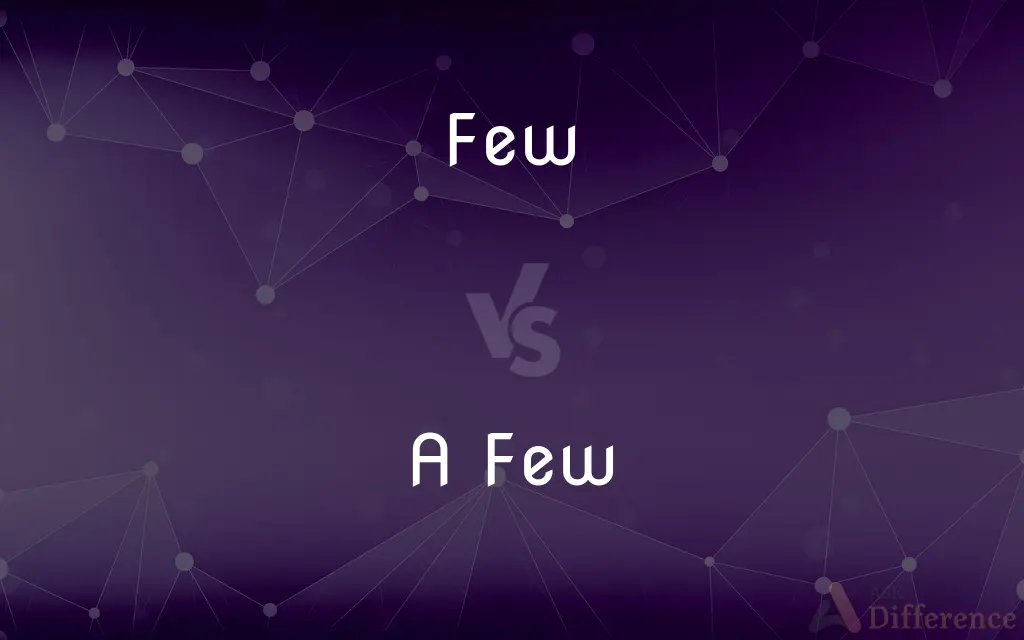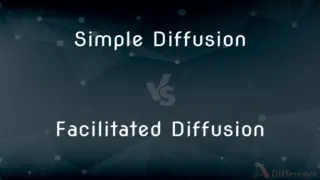Few vs. A Few — What's the Difference?
By Tayyaba Rehman — Published on December 22, 2023
"Few" implies a small number and often emphasizes scarcity or insufficiency, while "A Few" suggests a small number but indicates some or enough.

Difference Between Few and A Few
Table of Contents
ADVERTISEMENT
Key Differences
"Few" and "A Few" are both quantifiers used to indicate a small number. However, their nuanced differences in usage can convey different meanings in English.
When we use "Few", it emphasizes a negative sense, suggesting that there is a lack or scarcity of something. For instance, saying "Few people attended the event" highlights the insufficient number of attendees. On the other hand, "A Few" carries a more positive connotation. Stating "A Few people attended the event" means that, though not many, some people did indeed show up.
Both "Few" and "A Few" are used before plural nouns. For example, one might say, "Few students passed the exam" or "A Few students passed the exam." Yet, the former suggests that the number of students is disappointingly small, whereas the latter means that there are a small number of students, but not necessarily disappointingly so.
Interestingly, adding "very" before "Few" intensifies its negative connotation. "Very Few students passed the exam" underscores the scarcity even more. Meanwhile, "A Few" retains its meaning of a small, but not insignificant, number, no matter the context.
In essence, while both "Few" and "A Few" refer to a small quantity, the former often emphasizes insufficiency, and the latter indicates presence or sufficiency.
ADVERTISEMENT
Comparison Chart
Connotation
Negative, emphasizing scarcity.
Positive, indicating some or enough.
Typical Use
Before plural nouns to indicate lack.
Before plural nouns to indicate presence.
Intensification
Can be intensified with "very" for greater scarcity.
Doesn't emphasize scarcity even when intensified.
Example Sentiment
Disappointment or insufficiency.
Acknowledgement of some quantity.
Meaning in Quantity
Almost none or very limited.
Small in number, but not insignificant.
Compare with Definitions
Few
Refers to a small number emphasizing lack.
Few people understand quantum physics.
A Few
Indicates a small number with a neutral or positive implication.
A Few surprises are in store for you.
Few
Can suggest something is rare.
Few instances have ever been recorded.
A Few
Refers to a small number without emphasizing lack.
A Few friends came over for dinner.
Few
Indicates a small number with a negative implication.
Few attendees showed up due to the storm.
A Few
Implies a limited quantity but not insignificant.
A Few methods were tested and proved successful.
Few
Used before plural nouns to indicate scarcity.
Few students were able to complete the assignment.
A Few
Used before plural nouns to indicate some quantity.
A Few books on the shelf are bestsellers.
Few
Amounting to or consisting of a small number
One of my few bad habits. See Usage Note at less.
A Few
Can suggest more than two but not many.
A Few days ago, I heard the news.
Few
Being more than one but indefinitely small in number
Bowled a few strings.
Few
An indefinitely small number of persons or things
A few of the books have torn jackets.
Few
An exclusive or limited number
The discerning few.
The fortunate few.
Few
(preceded by another determiner) An indefinite, but usually small, number of.
There are a few cars (=some, but a relatively small number) in the street.
Quite a few people (=a significant number) were pleasantly surprised.
I think he's had a few drinks. [This usage is likely ironic.]
Few
(used alone) Not many; a small (in comparison with another number stated or implied) but somewhat indefinite number of.
There are very few people who understand quantum theory.
I was expecting a big crowd at the party, but very few people (=almost none) turned up.
Few
Obscuring one to two oktas (eighths) of the sky.
Tonight: A few clouds. Increasing cloudiness overnight.
NOAA definition of the term "few clouds": An official sky cover classification for aviation weather observations, descriptive of a sky cover of 1/8 to 2/8. This is applied only when obscuring phenomena aloft are present--that is, not when obscuring phenomena are surface-based, such as fog.
Few
(US?) Having a 10 percent chance of measurable precipitation (0.01 inch); used interchangeably with isolated.
Few
Few people, few things.
Many are called, but few are chosen.
Few
Not many; small, limited, or confined in number; - indicating a small portion of units or individuals constituting a whole; often, by ellipsis of a noun, a few people.
Few know and fewer care.
Few
An indefinite but relatively small number;
They bought a case of beer and drank a few
Few
A small elite group;
It was designed for the discriminating few
Few
A quantifier that can be used with count nouns and is often preceded by `a'; a small but indefinite number;
A few weeks ago
A few more wagons than usual
An invalid's pleasures are few and far between
Few roses were still blooming
Few women have led troops in battle
Few
May imply not as many as expected or hoped for.
Few solutions were found for the complex problem.
Common Curiosities
Does A Few mean there's a sufficient amount?
"A Few" indicates a small number, but not necessarily insufficient.
Can I use Few and A Few interchangeably?
While both indicate a small number, they have different connotations, so context is important.
Which one has a negative implication?
"Few" often carries a negative implication of insufficiency.
Are both used with plural nouns?
Yes, both "Few" and "A Few" are typically used before plural nouns.
How does "A Few" differ in meaning from "Several"?
Both suggest a small number, but "Several" might imply a slightly larger quantity than "A Few".
Can "A Few" ever suggest disappointment?
Context is key; "A Few" can suggest disappointment if fewer than expected.
Can I intensify the meaning of Few?
Yes, using "very" before "Few" can intensify its sense of scarcity.
What is the main difference between Few and A Few?
"Few" emphasizes scarcity, while "A Few" suggests some or enough.
How do I decide when to use Few or A Few?
Consider the sentiment you wish to convey; use "Few" for scarcity and "A Few" for some presence.
Can "Few" ever have a neutral meaning?
While it can, "Few" often leans towards a negative connotation.
Are "Only a few" and "A Few" the same?
"Only a few" emphasizes limitation more than "A Few" does.
Can A Few be used in positive situations?
Absolutely, "A Few" can be used positively, like "A few surprises await you."
What's a synonym for Few emphasizing scarcity?
"Scant" or "sparse" can be used similarly to "Few".
Is "A Couple" the same as "A Few"?
While similar, "A Couple" often refers to two, whereas "A Few" can mean more than two but not many.
Can Few be used without a noun following it?
Yes, in some contexts, like "Few were present."
Share Your Discovery

Previous Comparison
Simple Diffusion vs. Facilitated Diffusion
Next Comparison
Orthodox Jews vs. Unorthodox JewsAuthor Spotlight
Written by
Tayyaba RehmanTayyaba Rehman is a distinguished writer, currently serving as a primary contributor to askdifference.com. As a researcher in semantics and etymology, Tayyaba's passion for the complexity of languages and their distinctions has found a perfect home on the platform. Tayyaba delves into the intricacies of language, distinguishing between commonly confused words and phrases, thereby providing clarity for readers worldwide.












































